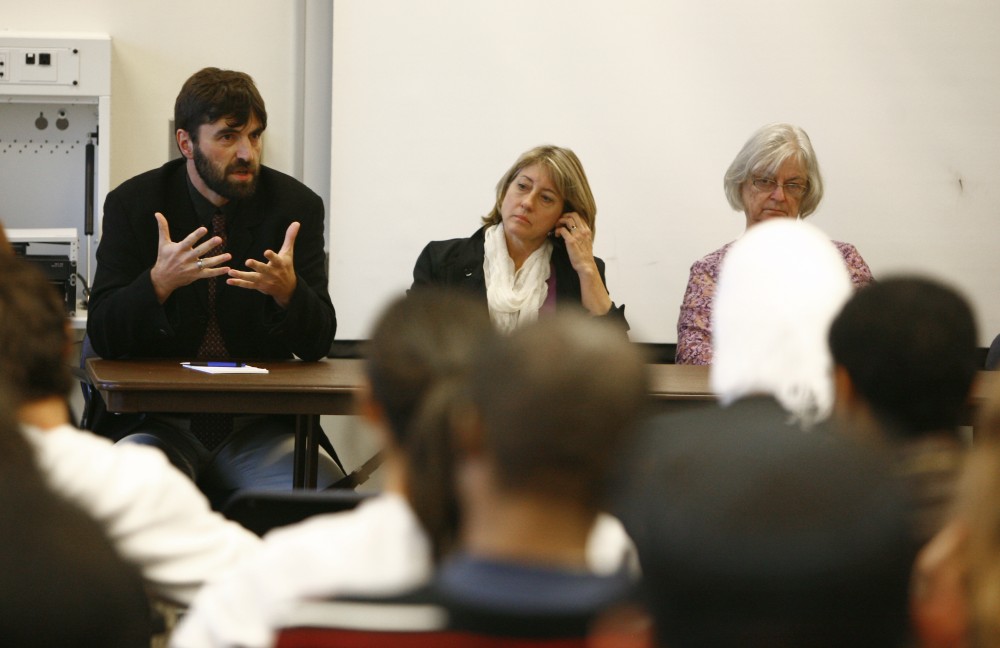Panel discusses Middle East protests of American film

GVL / Eric Coulter Sebastian Maisel and Polly Diven talk about the anti-islamic film
Oct 7, 2012
In response to September’s anti-American protests in the Middle East sparked by the anti-Islam film trailer, “The Innocence of Muslims,” Grand Valley State University hosted a discussion panel to address the issue from the perspectives of numerous disciplines.
The Middle Eastern Studies department, the International Student Organization and Padnos International Center collaborated to organize the event, which took place on Thursday.
Samia Fitouri, an international student from Tunisia, helped arrange the discussion and served as a panelist representing the Arab voice. Fitouri approached the issue by looking at why the protests transpired in the countries considered the birthplace of what has become known as the “Arab Spring.”
“For the case of my country and all the countries like Libya and Egypt, (they have lived) under human rights abuses,” Fitouri said, adding that their experiences have made them more prone to violence. “The most optimistic evaluation of their situation today is to say that they are in the midst of a transition. Even with this positive notion, these places have shown us that change is painfully slow as it (happens to) countries.
“This slow process of political and social rebuilding combined with a long, painful experience of political and religious oppression has resulted in great weakness and increasing sensitivity (to abuses),” Fitouri said. “The most common point to express this feeling was unfortunately taken to the streets.”
Fitouri said a second possible explanation of the riots pertains to freedom of speech, which has been limited in countries like Libya, Syria and Egypt for decades.
Certain policies enforced by the regimes have made many people believe that any cartoon or movie produced and distributed is official government policy, and that everyone agrees with it, Fitouri said. This notion relates back to the idea of a cultural clash.
“While (many Eastern groups) ignore the fact that there is nothing that western governments can do to restrain their citizens from expressing their opinions, no matter how absurd they are, Western societies have become adjusted to seeing an armed mob on CNN or Fox News and associate that image with an entire country or religion,” Fitouri said. “This deep misunderstanding has resulted in the clash of two civilizations.”
Assistant Professor Sebastian Maisel of the Middle Eastern Studies department said many Western cultures have also failed to understand or acknowledge the importance of Mohammed to the Islamic community, an issue that strikes painfully with Muslims who honor and revere their prophet.
Mohammed was critical in shaping Muslim identity, and his inaccurately violent portrayal in movies, cartoons and other media formats is “horrible in the eyes of all Muslims,” Maisel said
“Every time things like this happened … an immediate reaction was noticed in the Muslim community,” Maisel said, adding that the offenses are recurrent and he fears the clash of civilizations will eventually culminate in something more dangerous and more violent.
“I’m worried that now we’re going to see something new, a new film, a new act, a new event,” Maisel said.
And these new events may not do anything to improve anti-Americanism in the Middle East, a topic that was discussed by panelist Polly Diven, professor of political science and director of the International Relations program.
Associate professor Barbara Roos of the Film and Video program contributed to the discussion by citing other films linked to social unrest, like “Battleship Potemkin.” Despite the apparent links between the movies and civil unrest, Roos noted that “there is no simple, linear relationship between mass media form and content and its influence on human behavior.”
However, she did not disregard reactions to matters of religion. “Reactions to issues of faith and that we talk about (them) is important,” Roos said.
Maisel, Diven and Roos agreed that “The Innocence of Muslims” was made to incite friction between Eastern and Western civilizations, but Roos recognized a teachable moment amid the turmoil.
That is, the world can use this instance “to produce a good discussion, a real discussion about the nature of the first amendment here and abroad,” Roos said.
Fitouri also found hope in the situation.
“I want to conclude on an optimistic note by saying that today, the West should not abandon the East,” Fitouri said. “The same American social media outlets that gave voice to the Arab Spring could be used today to launch new dialogues about civic responsibility. Youth from the West and the East should be a powerful stepping stone toward mutual understanding to prevent a tragedy like this to happen.”

























